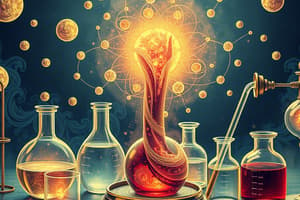Podcast
Questions and Answers
રસાયણશાસ્ત્ર માનવની ક્યારેય સમજવા અને વયવહાર કરવાનું પ્રયત્ન કરતું હતું.
રસાયણશાસ્ત્ર માનવની ક્યારેય સમજવા અને વયવહાર કરવાનું પ્રયત્ન કરતું હતું.
સંપ્રકટાય
______ અણે માનવના ભાગાના સંઘટન, ગુણો અને પ્રતિક્રિયાઓને તરફથી તરફ સમીક્ષા કરે છે.
______ અણે માનવના ભાગાના સંઘટન, ગુણો અને પ્રતિક્રિયાઓને તરફથી તરફ સમીક્ષા કરે છે.
રસાયણશાસ્ત્ર
ધાતુ અને અધાતુ સંબંધિત શબ્દો જે પ્રાચીન ભારતીય દર્શનની સિદ્ધાંતોથી જોડાયેલ છે.
ધાતુ અને અધાતુ સંબંધિત શબ્દો જે પ્રાચીન ભારતીય દર્શનની સિદ્ધાંતોથી જોડાયેલ છે.
આયુર્વેદ
દ્વારકાધીશ મહારાજ દ્વારા પ્રથમ સિન્થિસિઝેશન કરવાનું કોનું આવિષ્કાર થયું.
દ્વારકાધીશ મહારાજ દ્વારા પ્રથમ સિન્થિસિઝેશન કરવાનું કોનું આવિષ્કાર થયું.
સાત પ્રાથમિક જૈવિક ઊત્તરો, અથવા તત્વો, શરીરની રચનાની કોઠાઓ છે.
સાત પ્રાથમિક જૈવિક ઊત્તરો, અથવા તત્વો, શરીરની રચનાની કોઠાઓ છે.
આયુર્વેદમાં, ધાતુનો અર્થ માજા (પોષણ) ને મુજબુત કરવાનો અર્થમાં _____ અને _____ (સ્થળ).
આયુર્વેદમાં, ધાતુનો અર્થ માજા (પોષણ) ને મુજબુત કરવાનો અર્થમાં _____ અને _____ (સ્થળ).
બાયોલોજીક સિસ્ટમ્સ અને તબીબીના સંદર્ભમાં ધાતુ/અધાતુના આ બે ઉપવિષ્ટો ની સારવાર કરી શકાય છે.
બાયોલોજીક સિસ્ટમ્સ અને તબીબીના સંદર્ભમાં ધાતુ/અધાતુના આ બે ઉપવિષ્ટો ની સારવાર કરી શકાય છે.
માનવ જેનોમનું શોધનું ખોજવું મોક્ષોનું આધાર બનાવ્યું છે, જે _____ અને ધાતુના અંગોને જગાવવાનો અવકાશ આપ્યો.
માનવ જેનોમનું શોધનું ખોજવું મોક્ષોનું આધાર બનાવ્યું છે, જે _____ અને ધાતુના અંગોને જગાવવાનો અવકાશ આપ્યો.
આયુર્વેદ અને સાંખ્ય દર્શનો માનવ આરોગ્ય અને ભલાનો સમજણામાં મદદ કરી શકે છે, જે _____ અને વિજ્ઞાનમાં શરૂઆત કરી શકે છે.
આયુર્વેદ અને સાંખ્ય દર્શનો માનવ આરોગ્ય અને ભલાનો સમજણામાં મદદ કરી શકે છે, જે _____ અને વિજ્ઞાનમાં શરૂઆત કરી શકે છે.
ધાતુ અને અધાતુ વિચારોનું પરિચય અમારી હાજરી અને અમારું સ્થાન સમજવામાં મદદ કરવામાં આવે છે.
ધાતુ અને અધાતુ વિચારોનું પરિચય અમારી હાજરી અને અમારું સ્થાન સમજવામાં મદદ કરવામાં આવે છે.
Flashcards are hidden until you start studying
Study Notes
Exploring Science: Chemistry and Dhatu/Adhātu
Science encompasses a vast, interconnected web of knowledge, each thread carrying the warp and weft of human curiosity. In this exploration, we'll dive into two specific branches: chemistry and the Sanskrit concepts of dhatu and adhātu.
Chemistry
Chemistry examines the composition, properties, and interactions of matter. It's a cornerstone of modern science, with its roots traceable to ancient civilizations' attempts to understand and manipulate materials. The periodic table, a chart that organizes the elements based on their atomic structure, is a testament to the progress we've made since its inception by Dmitri Mendeleev in the 19th century.
Chemistry has contributed to modern society's technological advancements. It's responsible for the materials we use, the medicines we take, and the energy we consume. For instance, the synthesis of penicillin, discovered by Alexander Fleming, revolutionized medicine by allowing us to treat bacterial infections with relative ease.
Dhatu and Adhātu
The Sanskrit words dhatu and adhātu are related to the concept of matter in ancient Indian philosophies, specifically those of Ayurveda and Sāṃkhya. Dhatu refers to the seven primary biological tissues, or elements, that make up the human body: plasma, blood, muscle, fat, bone, marrow, and reproductive. These tissues are the building blocks of our physical form.
Adhātu is a broader concept that refers to the fundamental substances that compose the world. In Sāṃkhya philosophy, there are two primary adhātu: prithvī (earth) and ākāśa (space). These are considered the fundamental elements from which all other forms arise. In Ayurveda, the concept of dhatu is similar to the concept of māja (nourishment), representing the nutritional components that sustain the dhatu elements of the body.
The Intersection of Chemistry and Dhatu/Adhātu
The intersection of these two subtopics can be examined in the context of biological systems and medicine. By understanding the components of living organisms, we can apply that knowledge to improve health and well-being. For instance, the discovery of the human genome, which is made up of DNA, allowed researchers to study the molecular basis of disease and develop targeted therapies.
Furthermore, Ayurveda and Sāṃkhya philosophies provide insights into the interconnectedness of living organisms and the universe, which can help inform our understanding of human health and well-being. For example, the concept of prāṇa (vital life force) in Ayurveda and Sāṃkhya philosophy can be compared to the concept of energy in chemistry.
In conclusion, by exploring the branches of science such as chemistry and the Sanskrit concepts of dhatu and adhātu, we gain a deeper understanding of the world around us and our place within it. This knowledge not only contributes to the advancement of technology and medicine but also allows us to understand the interconnectedness of all life and matter.
Studying That Suits You
Use AI to generate personalized quizzes and flashcards to suit your learning preferences.




